« May 2009 | Main | July 2009 »
June 30, 2009
Speeding the progress to useful lawyer.
Here's one thought-out solution to the "low value-added" problem associated with starting lawyers. Over the last 18 months, other writers and commentators, in bits here, and pieces there, may have suggested what LOR co-founder Paul Lippe says here--but certainly not as well or as comprehensively. See at the June 22 AmLaw Daily Lippe's article, "Welcome to the Future: Time for Law School 4.0".
Posted by JD Hull at 11:59 PM | Comments (0)
Charon QC: Bearing gifts, as always--so take this with you to Nantucket.
Law School for Cretins? WAC? happens to know that he is traveling; we aren't at liberty to say where. While his "anonymity" may have all along been in great jeopardy, if not totally blown, that secret will remain with us. As always, the man's been busy--but has left us plenty of summer reading while he's away. See "Beware of Greeks causing rifts… and other thoughts…"
Posted by JD Hull at 11:59 PM | Comments (0)
Bosphorus Law
See this one by Phil Hodgen at Hodgen Law Group PC, an international tax boutique.

"New" by Ottoman Empire standards, the Sultan Ahmed Mosque in Istanbul was built in the early 1600s. It's one of several mosques in Europe and the Near East known as "Blue Mosque" due to the blue interior tiling.
Posted by JD Hull at 11:59 PM | Comments (1)
June 29, 2009
Brains on purpose. Change on purpose.
And mediocrity as a choice. People will sigh and tell you "well, people just don't change." Well, they are wrong--and that entire notion is a design for (1) failure, (2) mediocrity, (3) settling and (4) otherwise failing to grow.
All of my life I have seen people change. And change in extraordinary ways. They choose it.
The catch: you must do it yourself. The wonder: you are always doing it anyway. So make it work for you.
Stephanie West Allen floored me in a conference call two months ago when she reminded the group and me that science has us changing our brains on an ongoing basis, whether we like it, or are aware of it, or not. She has two sites: Brains on Purpose and Idealawg. These are both must reads, even for people with limited time.
Any Tom Edisons or Ben Franklins in the house? Another reason to read West Allen is that she is one of the few lawyer-consultants who had steadfastly refused to align herself with the "work-life balance" movement*, now in its death throes amongst those with a modicum of self-respect and ambition. In that regard, see West Allen's enduring article, "Hot Worms and Workaholics: Let the Workers Be!", and this later piece "Hot, Cool and Cold Worms: A Contrarian Look at Work-life Balance and So-called 'Workaholism'".

Even ill-fated Oedipus knew that there are a lot of things you can change. Above: "Oedipus At Colonus", 1798, Fulchran-Jean Harriet (1776-1805), Cleveland Museum of Art.
*Historical Note: Also known as the "work-wank" balance movement" (circa 2003 - May 2009), and seemingly out of an Ayn Rand novel, WWB was devised and promoted primarily by self-loathing American workers who were so depressed about their perceived lack of talent, achievements and future prospects that it became necessary for them to create "work environments" in which they would no longer feel inadequate, underachieving and threatened by those with more energy and moxie. How to accomplish that? According to members of the heroic pro-work, anti-wank Resistance, which had infiltrated secret work-wank cells (operating weekdays 9 to 5), the Movement had planned to make U.S. Doers, Drivers, Inventors, Creators and Producers feel unwelcome and anachronistic in the workplace. The WWB ruse, fortunately, failed, when at the last minute many Yanks--with a timely boost from a lingering late-2008 Recession--woke up and remembered who they really are.
Posted by JD Hull at 12:59 AM | Comments (0)
June 28, 2009
Down but never out in the Andes.
Many more people have died for their drink and their dope than have died for their religion or their country.
--Aldous Huxley, 1958
Cocaine is patient--and always ready for a comeback. The Economist, a bit jacked up on the subject of drugs lately, has much to say this week about fallen cocaine production in "Mixed Signals Among the Coca Bushes".
Posted by JD Hull at 11:36 PM | Comments (0)
June 24, 2009
Ellen Bry: Stamford Connecticut girl makes good (again).

Some girls just love to work. Our friend Ellen Bry, a nighttime drama television mainstay (St. Elsewhere, Dexter, Boston Legal, Monk, The Closer) for decades, and known in the LA-NYC underground as WAC?'s in-house photographer, has the lead role as Ester Hobbes, a Chicago socialite who suddenly loses everything, in The Lost & Found Family, a new Sony Pictures release. In the film, we meet a strong and spiritual woman who is surprised to learn that she has inherited just one thing from her dead businessman husband: a run-down old house in Georgia, and the turbulent foster family living in it.
Taken from the story Mrs. Hobbes' House, The Lost & Found Family is a poignant, uplifting, instructive and remarkably powerful family film set in the American South. It was filmed in Jackson, Georgia, a town between Atlanta and Macon, with a population of about 4000, in Butts County.
It is a movie for people who go to church, sing, say "golly", watch lots of TV, eat a lot, and are afraid of virtually everyone and everything all the time. It is therefore bound to be a cult classic, comforting to millions residing in the vast grayness and troubled reverie that is American Fly-Over Country.
Just joshing you.
Early in 2008, I saw a rough cut of The Lost and Found Family--then still entitled Mrs. Hobbes' House--before Sony acquired it. I recognized the people portrayed. Many Americans, including my own family, have roots that reach deeply into, say, southwestern Virginia, east Tennessee, and southern Missouri (where I've visited family my entire life), going back well over two centuries.
Later generations are still there: always hard-working and proud, sometimes devout, seldom well-to-do, and worlds away from the country club life Ester Hobbes led when her husband was alive. They often struggle to make the best life they can.
You need not be Southern, rural or devoted to any form of organized religion to be moved by Ester Hobbes' story. This film will touch every viewer with simple but forgotten verities that bind us to one another.
There are artful, and moving, performances by Ellen and her younger cast members, who include teen heartthrob Lucas Till (Walk The Line, Hannah Montana: The Movie), and Jessica Luza, a film and television actress (The Sullivan Sisters, Boston Legal) and MTV fashion host. Ellen's other movie credits include Mission Impossible 3, Deep Impact, and Bye, Bye Love.
Posted by JD Hull at 12:59 AM | Comments (0)
U. S. Copyright Office: Getting the bugs out of a $52 million "process".
"Who sold you that [expletive] and why did you buy it?" Ironically, over at the Library of Congress, a new $52 million electronic technology designed "to speed things up" has resulted in delays at the U.S. Copyright Office in processing paper copyright applications. Instead of the customary 5-month processing time, paper applications (which still account for roughly half of all submissions) may take up to one year to process. The Washington Post noted last month that applicants are reportedly waiting up to 18 months for their paper applications to be processed. Meanwhile, the Copyright Office says it's getting an "upgrade".
Posted by Rob Bodine at 12:59 AM | Comments (0)
June 23, 2009
Hello. City Desk? Get me rewrite, doll. This is Juror No. 8.

And stop the presses. Here's something you don't see every day--but then you wonder why more jurors aren't taken to task for texting, tweeting, phoning, blogging and otherwise messaging. Milwaukee's Anne Reed at Deliberations has this one from March we almost missed, and there's nothing stale about it: "The Fourth Circuit And The Juror Who Called The Press". And see U.S. v. Basham, the Fourth Circuit's March 30 opinion reviewing claims of errors in the grisly 2004 murder trial of a defendant sentenced to death.
It starts out when a producer from a Greenville, South Carolina television station contacted the district court judge right after the verdict came; he told the judge that during deliberations a juror had called to inquire why the station was not reporting on the trial, and to offer a few observations on the proceeding. No big deal, maybe, right? But then, as Anne Reed notes:
When the phone records came out, there was even more. "Wilson [the jury foreperson] made a six-minute call to WSPA, two one-minute calls and a four-minute call to WHNS Asheville, a two-minute call to WYFF in Greenville, a two-minute call to the Greenville News, and a one-minute call to the Spartanburg Herald. These latter two calls to newspapers had not been reported by Wilson during her initial testimony."
And more: "seventy-one calls between her and two other jurors from September through October 2004," including calls on days of critical testimony.
Read Anne's post to learn the Fourth Circuit's take on the foreperson's misconduct, and whether a new trial was warranted.
Posted by Rob Bodine at 11:59 PM | Comments (0)
It hovers, takes hostages, and moves on to the next town.
"I see defeated people. They're everywhere. They walk around like everyone else. They don't even know they're defeated." It's a choice--in your life and in your work. You always know if you are "there". You just don't know how you got there. You started compromising on things you once embraced as essential. Redford sent us this short Seth Godin post called "On the Road to Mediocrity" about "settling along the way". Avoiding mediocrity? Keeping the monster at bay? WAC? is no Seth Godin. But our take is that great habits learned early on difficult work is step one. Step two is vigilance. The fine thing about posts like Godin's? If it bothers you, you needed to read it.

"I see people who keep mailing it in." (Buena Vista Pictures)
Posted by JD Hull at 11:59 PM | Comments (0)
The National Journal: Team Obama
The "people who run things" in the new administration are carefully collected for you in this interesting and useful article cataloguing what looks like a talented, credentialed and hard-working Team Obama. See by James Barnes and the National Journal staff "Obama's Team: The Face Of Diversity". It's marred only by a trumpeted and somewhat lame observation that less than half of the senior posts are filled by white men. Can we get past that, please?
Posted by JD Hull at 12:11 AM | Comments (0)
June 22, 2009
Antitrust: Catching up with ICANN.

A complaint alleging antitrust violations against Verisign--the corporation with exclusive contracts with the Internet Corporation for Assigned Names and Numbers (ICANN) to maintain .com and .net domain name registries--states a valid claim.
In Coalition for ICANN Transparency, Inc. v. VeriSign, Inc., No. 07-16151 (June 5, 2009), the Ninth Circuit reversed and remanded the decision of the U.S. District Court for the Northern District of California with respect to one of the contracts. It held that the claims concerning the ".net contract" were correctly dismissed due to the competitive bidding process that preceded its execution; however, it held the ".com contract" to be much more suspect in the absence of such bidding--and so those claims were valid.
The Ninth Circuit explained that, because the complaint alleged that an automatic renewal provision harmed free-market competition in and of itself (as opposed to individual competitors), it properly stated a claim for restraint of trade under Section 1 of the Sherman Act. The Ninth Circuit also allowed a claim under Section 1 that alleged that the price per domain name--to which VeriSign and ICANN agreed--exceeded the rate competitive market conditions would produce, thus causing actual injury to competition. It recognized that this bilateral action is held to a higher standard than the unilateral price setting appearing in the cases on which the district court relied.
Finally, based on arguments both by the parties and in amicus briefs, the Ninth Circuit noted that expiring domain names may now represent a market distinct from other names, and remanded the case to the district court to make that determination. If deemed a separate market, the claims under Section 2 of the Sherman Act for attempted or actual monopolization based on predatory conduct should be allowed.
The plaintiff here must still prove the allegations. But at least it will get its day in the Northern District.
Posted by Rob Bodine at 11:59 PM | Comments (0)
June 19, 2009
Jammie Thomas file-sharing case: Virgin Records et al. win again.
So justice really is hard--even harsh. We've followed and written about this one for over two years: Virgin Records America, Inc. v. Thomas, 06-1497, D. Minn. 2006. Yesterday, the same result--and we think the right one--was obtained in the re-trial of the case against a sympathetic defendant. Jammie Thomas is single mother of modest means who was sued for downloading music in violation of copyright laws. Music industry plaintiffs focused on only twenty-four out of hundreds of likely infringements by Thomas.
Seven record companies claimed against her, alleging willful infringement, and exposing Thomas, then about 30, to big penalties. U.S. District Judge Michael Davis presided over the first trial in 2007; he ordered a new trial after deciding he had erred in jury instructions. We hope to write more later about the dispute--and what it means for hundreds just like it. In the meantime, there's no shortage of news coverage. See Associated Press:
Jury Rules against Minnesota Woman in Download Case
MINNEAPOLIS (AP)--A replay of the nation’s only file-sharing case to go to trial has ended with the same result, finding a Minnesota woman to have violated music copyrights and ordering her to pay hefty damages to the recording industry.
A federal jury ruled Thursday that Jammie Thomas-Rasset willfully violated the copyrights on 24 songs, and awarded recording companies $1.92 million, or $80,000 per song.
Thomas-Rasset's second trial actually turned out worse for her. When a different federal jury heard her case in 2007, it hit Thomas-Rasset with a $222,000 judgment. [more]
Posted by JD Hull at 11:47 PM | Comments (0)
Financial regulation in America: A British view.
See an opinion piece entitled "Better broth, still too many cooks" in this week's The Economist. It is a critique of the Obama administration's plans (and new white paper) for U.S. financial reform. The article hits a high note in the beginning: a portrait of a vast, clumsy, and myopic animal that is our current system of financial regulation:
There is both too much of it and too little. Multiple federal agencies oversee the financial system: five for banks alone, and one each for securities, derivatives and the government-sponsored mortgage agencies. They share these duties with at least 50 state banking regulators and other state and federal consumer-protection agencies.
Yet all these regulators failed to anticipate and prevent the worst financial crisis since the Depression, because risk-taking flourished in the cracks between them. Toxic subprime mortgages were peddled by lenders with little federal oversight and shoved into off-balance-sheet vehicles. The greatest leverage accumulated in firms that avoided the capital requirements of banks.

TriStar Pictures, Inc.
Posted by JD Hull at 05:31 PM | Comments (0)
June 17, 2009
Patten on UK redundancies.
Whenever two good people argue over principles, they are both right.
--Marie von Ebner-Eschenbach, Austrian novelist (1830-1917)
Or "terminations", or firings, to Yanks. To mediate, or not to mediate? asks London's capable Justin Patten, in his Human Law Mediation Ezine for June. I met Justin, a solicitor and ADR consultant, in early 2007 near the Marble Arch. We have followed him and kept in touch ever since. A few days before meeting Justin, we had mentioned him, and a few other notable Brit lawyer-writers in "UK Bloggers: The Good, the Erudite and the UnHoly."

Posted by JD Hull at 08:22 PM | Comments (0)
June 16, 2009
"Mexico: Working With The Mañana Culture"
By Fernando E. Rivadeneyra, Puebla, Mexico
Editor's Note: Fernando Rivadeneyra is a talented and highly-regarded business lawyer who works literally all over the world. In fact, Fernando and his firm were "international" back in those days when international "wasn't cool" or trendy; he's been a pioneer in working in global legal and business markets.
And he is also a colleague, and a close friend. My partner Julie McGuire and I have met with Fernando and other members of his firm, Rivadeneyra, Treviño & de Campo, countless times over the past twelve years in Europe, Latin America, and the United States. We have worked together on client projects. Like our firm, Rivadeneyra, Treviño is an active member of the International Business Law Consortium, a working alliance of law and accounting firms based in Salzburg, Austria.
A founding partner of Rivadeneyra, Treviño, Fernando works in mergers and acquisitions, corporate structuring, foreign investments, and private international law. He is a member of the International Bar Association, the Mexican-American Law Institute, and its Export Support Group, and is Vice-President of the United States-Mexico Chamber of Commerce--Puebla Chapter. Jodie Paula Cohen, head of Client Relations at Rivadeneyra, Treviño & de Campo assisted in the preparation of this article.

Mexico: Working With The Mañana Culture
Be well informed and work with the right partners.
There are myriad differences between Mexican business culture and legal practice and those in the rest of the world. Nevertheless, by being well-informed and working with the right partners, it is entirely feasible for foreign companies to carry out fruitful business endeavors in this country.
The biggest cultural obstacle for many foreign investors in Mexico can be described in one word: “mañana.” Processes will likely be slower and appear more drawn-out than in your home country. It is important to accept this difference and not become impatient. There are many savvy business-people and lawyers in Mexico, and your business affairs will be dealt with (eventually) to a high standard.
If your investment in Mexico includes spending time there, be aware that certain parts of Mexico are less safe than your home country; and eating food from street-stalls is asking for trouble. Your Mexican business partners will be able to inform you of the many safe places to visit and the high-quality restaurants in which to eat.

Work With The Right Lawyers
There is no central source of information to help you choose a lawyer in Mexico. Many of our clients have found us through word-of-mouth recommendations, which can be a very reliable way to initiate contact with a new law firm. Similarly, lawyers from your home country who have carried out work in Mexico will likely have contacts here and will be able to make trustworthy recommendations.
Clients have also found us through the organizations in which we participate, such as the IBLC or IBA, or through the Martindale Hubbell directory. By approaching the members of respected international groups, clients can be assured that they are contacting reputable and highly-respected firms.
Unless your Spanish is fluent, make sure that your lawyers have a thorough working knowledge of your language (many Mexican lawyers speak English, and some also speak other languages). This will make your work eminently easier, especially when discussing the nitty-gritty of legal processes or contracts.
In Mexico, your lawyers need to maintain good relationships with government officials. A direct line to such officials will enable them to speed up legal processes on your behalf.
Carrying Out Projects In Mexico
The golden rule when doing business in Mexico is to get good, solid contracts and comprehensive legal assurances that your projects will be completed on time. Don’t leave anything to chance.
Health and safety standards have tended to be lower in Mexico than in many other countries. This situation is improving thanks to new environmental laws, and standards are now equal to those in many developed countries.
Do’s And Don’ts
* Do become familiar with the relevant laws and rules before you start. A good lawyer and a good accountant will be able to inform you about these.
* Do be patient. Time frames won’t be the same as in your home country, and deadlines may not be adhered to as closely.
* Do explain in detail what you want and expect so that you, your law firm and your local partners are reading from the same page from day one.
* Do respect the Mexican “way”. If you become frustrated, remember that a smile and a friendly gesture will always get you the best results when dealing with Mexicans.
* Do enlist the help of locals. As in many countries, locals sometimes receive preferential treatment over foreigners. For this reason, it can be worthwhile engaging local lawyers to carry out certain business tasks for you.
* Don’t get involved in corrupt practices; this will only spiral into bigger problems. If you are asked for a bribe, consult with a good law firm which will be able to advise you on how to deal with the situation.
* Don’t flaunt your wealth, either in business negotiations or in public.
* Don’t use risky legal or fiscal strategies. To safeguard your operations, it is best to stay well within the limits of the law.

Old Mexico City
Note: A version of this article originally appeared in December 2008 in The Complete Lawyer.
Posted by JD Hull at 11:59 PM | Comments (1)
Notes from the Breadline (Part V)
We got busy and we missed it. This is Part V of Above The Law's "Notes from the Breadline" by "Roxanna St. Thomas". It's about her adventures, and all manner of newly-discovered emotions, after losing her job at a law firm some months ago in NYC. For a lawyer, she writes pretty well--especially about all those different colors of angry out there. Below are excerpts from her weary yet simmering interview last week with a solo, zombie-like little man from a David Lynch set:
One day, I get an e-mail from a solo practitioner who has seen my resume online and wants me to come in for an interview.... When I arrive at his office, which is in one of the old, ornate buildings near Grand Central, my spirits are buoyed by the momentary sense that I am part of the bustle of commerce. A gilded chandelier in the lobby hangs over polished marble floors, and when I get out of the elevator upstairs my footsteps are cushioned by thick, red carpet. It feels anachronistic, but vaguely comforting.
But when I arrive at the suite I have written down, a door opens on a shared office space that is distinctly less grand. In fact, it reminds me of the war room I recently occupied, and I half-expect Mr. Potato Head to pop out from behind a plant, trailing a string of sausages. I try to ignore the sinking feeling that creeps through me as I sit in the reception area, waiting.
When the lawyer, a thin, cadaverous man who looks as though he escaped from the wax museum, comes out to fetch me, I quickly determine that I probably could toss him through the window, even without superhuman strength. He extends a limp hand and introduces himself as Asa, a name I have always associated with donkeys.
Once I am seated across from his desk, he tells me that he is looking for one associate to assist him in his solo practice. He takes out my resume and begins to pore over it. Silence descends. Minutes tick by. He tells me that he handles a lot of regulatory matters for shipping companies. Have I ever worked on such matters?
No, I answer, not specifically. How about admiralty? No again.
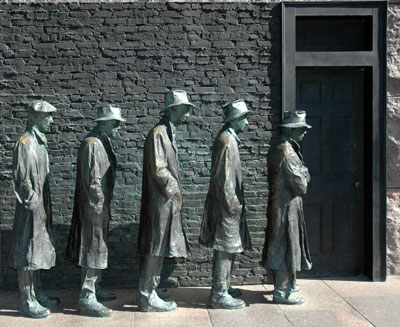
Posted by Rob Bodine at 04:54 PM | Comments (0)
June 15, 2009
The Economy: Europe moving right-ward--for now.
See "A United Europe?" by Michael Gates at Richard Lewis's Cross-Culture. Excerpts:
The recent European elections saw a significant lurch to the far right, which took many by surprise.
From a cultural perspective this was entirely predictable.
In difficult times like ours, when people have lost their jobs, feel political power is out of their control (Brussels), and that the cultural landscape of their own country is changing (immigration), it is easy to cling to what we first learned – our national values and beliefs – and to reject violently anything ‘other’ which threatens that.
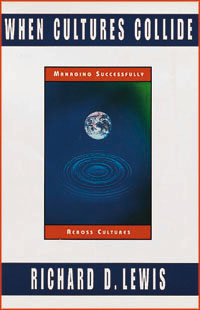
Posted by Rob Bodine at 11:59 PM | Comments (0)
Mañana at What About Clients?: Fernando Rivadeneyra

The biggest cultural obstacle for many foreign investors in Mexico can be described in one word: 'mañana.'
--Fernando E. Rivadeneyra, Puebla, Mexico.
Tomorrow, we'll feature a second appearance here by our friend and colleague Fernando Rivadeneyra, a partner at Rivadeneyra, Treviño & de Campo, a Mexican corporate law firm with a serious global reach. It is based in Puebla, Mexico, 100 kilometers southeast of Mexico City. Like Hull McGuire, Rivadeneyra, Treviño for many years has been a mainstay and leader in the International Business Law Consortium, based in Salzburg, Austria.
In March, we ran Fernando's two-part article, "Reinventing" the Latin American Law Firm . It was very popular for weeks. It detailed specific changes Rivadeneyra and his partners made to their respected Mexican law firm. Tomorrow's piece is about lawyering for clients in Mexico and Latin America: "Mexico: Working With The Mañana Culture" .
Posted by JD Hull at 11:38 PM | Comments (1)
Breaking: Local Boy Makes Good
Scott Greenfield of Simple Justice. NY Law Journal: "Free: Court Finds Attorney's Unsolicited Faxes Did Not Violate Communications Act".

Greenfield (client cropped from picture) celebrating.
Posted by JD Hull at 11:37 PM | Comments (1)
The Ninth Circuit: Banks, Credit Cards and Collections.
If you’re a bank, consider writing your contracts under New Hampshire law. (If you’re a cardholder, pay your bills).
If you have a credit card agreement with a choice of law clause subjecting any disagreements to New Hampshire law, there doesn’t seem to be a statute of limitations that applies. So says the U.S. Court of Appeals for the Ninth Circuit in Avery v. First Resolution Management, No. 07-35726 (decided April 2, 2009; amended May 22, 2009), reviewing a decision of the U.S. District Court for the District of Oregon. The decision was adverse to an Oregon credit card holder who was sued under the Fair Debt Collection Practices Act (FDCPA) after three years--the length of time limiting credit card disputes in New Hampshire.
Despite amicus briefs by advocacy groups warning of the consequences, the suit was allowed because New Hampshire law also tolls (essentially, suspends) the statute of limitations if the defendant wasn’t available for service of process in the state. The Ninth Circuit interpreted that the statute’s use of “state” referred to New Hampshire itself. But defendant Avery, like many credit card holders, had never even visited the state in question--so the statute of limitations could be tolled forever. The Ninth Circuit acknowledged this possibility in a footnote (at page 6097), but left it for the lower courts and, possibly, the New Hampshire legislature to hammer out.
In another debt-collection case interpreting the FDCPA itself, Hyde, et al. v. Midland Credit Mgmt., et al., 07-55326 (June 9, 2009) (factually unrelated to Avery), the Ninth Circuit reversed the U.S. District Court for the Central District of California. It held that the FDCPA does not permit a court to award attorney's fees against a plaintiff's attorney where the plaintiff brought a frivolous claim for alleged violations by a creditor. In the absence of specific language to the contrary, the customary presumption applies: if a plaintiff's attorney is to be held liable for a defendant's attorney's fees (or vice versa), then it would have to come through traditional means (e.g., Fed. R. Civ. P. 11).
Posted by Rob Bodine at 10:29 PM | Comments (1)
Wanted: One Huntin' Dog.

One gift of The Recession is that it has improved the work ethic of people of all ages, including people born after 1978. That's the idea, anyway. And it does make sense. Not sure I buy it, though.
For more than two decades, I've worked closely (i.e., every work day at least for a year) with dozens of associates with very fine resumes assigned tough things to do. It's always interesting to see who "gets it" the fastest, and who catches on fire with a yen for more. Practicing under constant pressures is not for everyone--but it's a great way to learn, grow and grow up.
But there is still a steady decline in young "huntin' dogs" in my shop and others. They talk a good game, especially at the interview--but weeks later they are never eager to help, or even around, when things get really tough. A customer or client emergency. A backlog in work. The unexpected--but that which can be solved. They are not there at midnight the two or three times a year you need that problem-solving.
Nice kids...but not people you want in the foxhole. To even the most irreverent or laid-back Boomer, it's a character thing.
The Recession? It's not changing anything. That's not their problem. It will "go away". Someone else will fix it for them. We're not just talking about associates, law students and legal assistants here. Maybe (a) the vast majority of younger workers never expected that work (or life) would be that "hard", and (b) high schools, colleges and graduate schools aren't helping to prepare them for the challenges of working for a good customer or client no matter what.
Life and Work do cruelly collide. You are sick. You are exhausted. Depressed. Your wife just left you. You were in a bad car accident two weeks ago. A close friend suddenly dies. Your boyfriend just confessed that he's been cheating on you. Your husband loses his job.
A child has trouble adjusting to a new school. A sibling is dying over a period of months or years while you, helpless, watch. A scare: You or yours may have cancer. Parents are failing. Your youngest may have some degree of autism.
These things will be part of anyone's--everyone's--life at work. And for a professional, and those key people who assist them, you can't call in and say "sorry, just too much life today--I can't make it".
The unexpected, the jarring, the tragic or the just plain annoying happens to you. This is part of the "terrain" of being a professional. No unemployed pseudo-consultant, or W-L balance proponent, can look you in the eye and tell you that, at those times, you can ever separate Work from Life.

I don't mean to be morose, or dramatic. But these days do happen. You are impaired, distracted, despairing. Sure, you get a few breaks from loved ones and colleagues.
But know this: On those very same days, you will have a deadline, an appearance in court, a deal, or a promise to keep. And the only prayer a good client may have is you. You are it.
I simply do not see people coming out of American schools these days who remotely understand the pain (and greatness) of being a professional on those isolated days--the ones that really define us. Those people are not currently in the pipeline. Don't expect many huntin' dogs for a long, long while. We bred and raised generation weenie. And weenies, of course, are all we're getting.
One Solution: "Buy Boomer". Time to solve the problem. Think a bit. How can you be sure that new recruits--even part-times and temps--aren't just wasting your time? Well, at my firm, we may "Go Old". Boomers. Say what you want about us. But we are there when you need us--and you don't even have to ask. We feel your pain. We never ever give up. Our parents and grandparents fought in horrible and important Great Wars. Working Well. Doing Our Job. It's the least we can do to pay them back.
Nothing beats having a Boomer in your office when it's time to get things done. We're irreverent, and fun, too. Energy, hustle, charm. Do-or-die. Have a nearly overwhelming sense of cultural identity. Loyal. Hardworking. Generation Moxie. You want something done? Done right? Then Buy Boomer.
Consider going straight to the top, for the best, and work from there:
HELP WANTED: Of counsel for growing and energetic Pittsburgh-based boutique business law firm with publicly-traded clients to die for. Candidate must have at least 8 years of highest level federal Exec. Branch experience, world-wide connections, Yale Law degree, one year at Oxford, own money and people skills. Crowd-pleaser. Must be able to sell anything to anyone.
And be originally from Hope, Arkansas. State government experience preferred but not required. Same for participation in Renaissance weekends, and fund-raising. United Nations experience also a big plus. You don’t need to re-locate. Happy to set up the office for you. Wherever you want. Harlem or Chappaqua, New York are okay. Or DC. You decide. You can work out of your house. Whatever.
NOTE: No previous private law practice experience necessary. Not a problem–no problem at all. Excellent benefits package.
Source of Help Wanted Ad: An earlier WAC? post, when the economy was better.
Posted by JD Hull at 01:31 AM | Comments (3)
June 14, 2009
John Hope Franklin
And Bill Clinton does Duke--but let's not miss the point. On Friday Bill Clinton gave a eulogy in the Duke Chapel for John Hope Franklin, the historian and civil rights figure who died in late March at 94. See The Miami Herald. Franklin wrote From Slavery to Freedom: A History of African-Americans, a classic first published in 1947. As is often the case with Clinton, his arrival on campus eclipsed his reason for being there. Nathan Freeman, a columnist at The Chronicle, the school's enduring student daily, certainly liked the idea of having the ex-president in the Gothic wonderland that is Duke University. Even before Clinton spoke, Freeman wrote: "Bring Bubba Back Again".
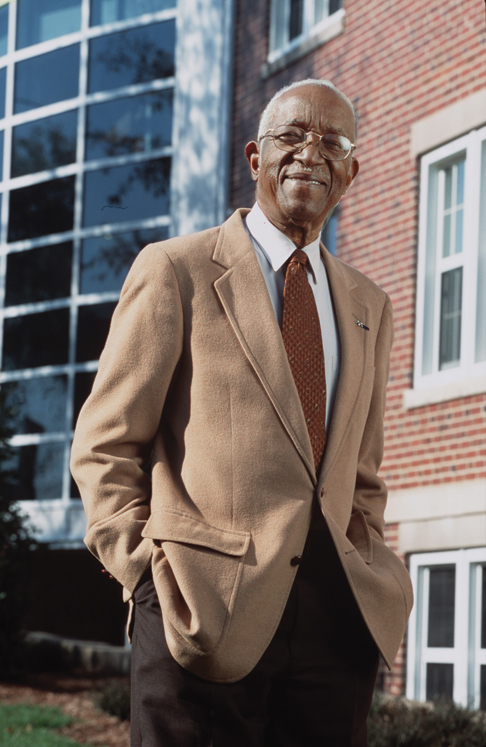
The real deal at Duke last week: John Hope Franklin
Posted by JD Hull at 02:17 AM | Comments (0)
June 12, 2009
The Economist: On the Public Debt
See "The Biggest Bill in History" in this week's The Economist. It begins:
The worst global economic storm since the 1930s may be beginning to clear, but another cloud already looms on the financial horizon: massive public debt. Across the rich world governments are borrowing vast amounts as the recession reduces tax revenue and spending mounts—on bail-outs, unemployment benefits and stimulus plans.
Posted by JD Hull at 10:27 PM | Comments (0)
June 09, 2009
Supreme Court's Massey Coal recusal decision: 5-4

Is that an elected state judge in your pocket? Or are you just happy to see me?
Quick and dirty re: elected state judges and campaign money. We've followed and written a lot on this U.S. Supreme Court case about an elected state supreme court judge and campaign money recipient who failed to disqualify himself in arguably suspect circumstances. The Court ruled on Monday that a West Virginia judge should indeed have disqualified himself from hearing an appeal of a $50 million jury verdict against an a coal company because its CEO had been a major campaign donor. WAC? thinks that the popular election of state judges--permitted in some aspect in a clear majority of the states--give the appearance of justice being "for sale". Elected judges can be especially for "bad" for good clients who do business all over the U.S. and the world.
And, of course, for business defendants who have no substantial ties to a state forum, and no jurisdictional recourse to a federal court. We are genuinely concerned about the issue--and often write about it with a mix of frustration and optimism. We simply believe that state systems that select judges via popular elections are something America outgrew over a century ago--and that such regimes, in the states that have them, set a bad example for the rest of the world. Although WAC? likes the result in Massey Coal, we're a bit surprised the vote was 5-4 to require recusal of the judge in question. More when we can get to it. In the meantime, see the Slip Opinion in the June 8 decision in Caperton v. Massey Coal, Inc. See also WSJ Law Blog, which cheered us up in yesterday's "Massey Coal Ruling Getting Thumbs Up in Judicial Circles".
Posted by JD Hull at 11:59 PM | Comments (2)
June 08, 2009
WAC Special: Raising the Bar--A Second Season Preview
Below Rob Bodine, WAC?'s newest co-writer, a Washington, D.C.-based IP lawyer, reviews this season's opening episodes of Raising The Bar. That's tonight, Monday, June 8, on TNT at 10 PM Eastern Time/9 PM Central Time:
ca⋅thar⋅sis /kəˈθɑrsɪs/ [kuh-thahr-sis]
–noun, plural -ses /-siz/ [-seez]1. the purging of the emotions or relieving of emotional tensions, esp. through certain kinds of art, as tragedy or music.
Random House Dictionary, 2009
Steven Bochco’s latest contribution to television, Raising the Bar, starts its second season tonight. The series centers on the interplay between the offices of the public defender and district attorney, the judges in front of whom they argue, and the clients whose lives are at stake.
The show is intensely character-driven. As in the shows involving different professions Bocho first made popular nearly thirty years ago, we get glimpses into work and personal lives--and how they clash.
The lawyer storylines. They do seem familiar, at times drawing from “hot-button” political topics, but adding a level of complexity not always seen. The cases presented show that sometimes there’s more to an issue than initially meets the eye. And that those with shared shared interests can be at odds.
The attorneys face the same tensions felt by the viewer in the real world, with only the context-- the legal system--being the difference. That is their world. By day, they’re bitter adversaries, deeply frustrated with each other’s legal positions; by night, they’re friends, sharing drinks and stories of their day.
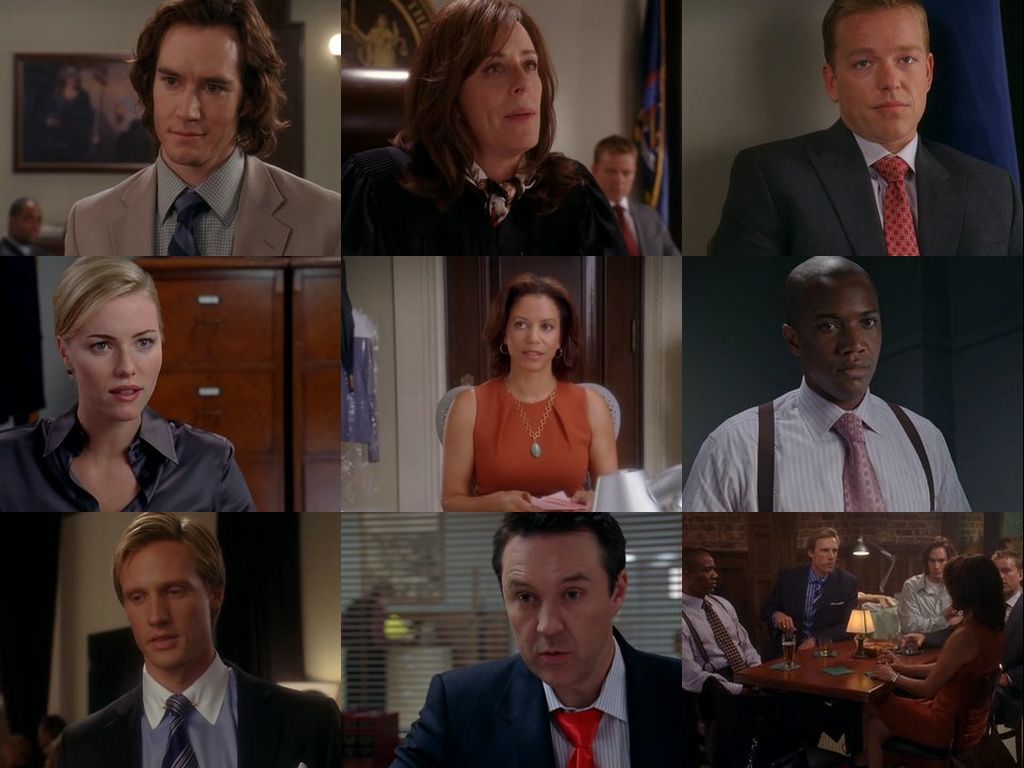
On the job, they’re ethically bound to represent their clients to the best of their ability, while also being ethically bound to allow the client to dictate the direction of that representation, either through political pressure (prosecution) or through prioritizing other interests above their own legal interests (defense), all the while making sure to check their egos at the door. Divorcing one’s feelings from the job is difficult--especially when your client is compellingly sympathetic, or even noble, in their cause. But it’s necessary, and Raising The Bar drives that one home convincingly.
Should idealistic Jerry Kellerman (played by Mark-Paul Gosselaar) change who he is for the sake of the job by sacrificing a trademark part of his personality? Can right-and-wrong prosecutor Marcus McGrath (played by J. August Richards) accept the conflict between the public’s interests with his superiors’ political interests?
Off the job, they’re ordinary people, facing ordinary problems. Should Kellerman and fellow public defender Bobbi Gilardi (Natalia Cigliuti) pursue their relationship even if it's potential ammunition against her in a bitter divorce? Should McGrath pursue a relationship with a woman who represents the political system with which he often finds himself in conflict?
For the lawyers watching the show, there’s something special in it for us. John Michael Higgins solidly delivers as your less than favorite judge. This isn't to say that there isn't dramatic license taken, but when you're looking unwind, do you really want to watch a show that's 100% accurate in its depiction of the law?
At a day's end, when egos have been bruised, frustrations are high, and hope dies a little, things can and do work out. You are uplifted, restored. Even Justice is served. A moral order in the universe, maybe? Mind you, when I was watching the advance tape this weekend, it hit me that RTB doesn't accomplish all this by insulting you and yours. Like you just died and went to Hallmark: "triumph of the human spirit", "people coming together and caring about one another...", learning to trust one another, working with one another despite their differences.
This show is very real about the ambiguities of real life--and real work. Sometimes, there’s no one right answer.
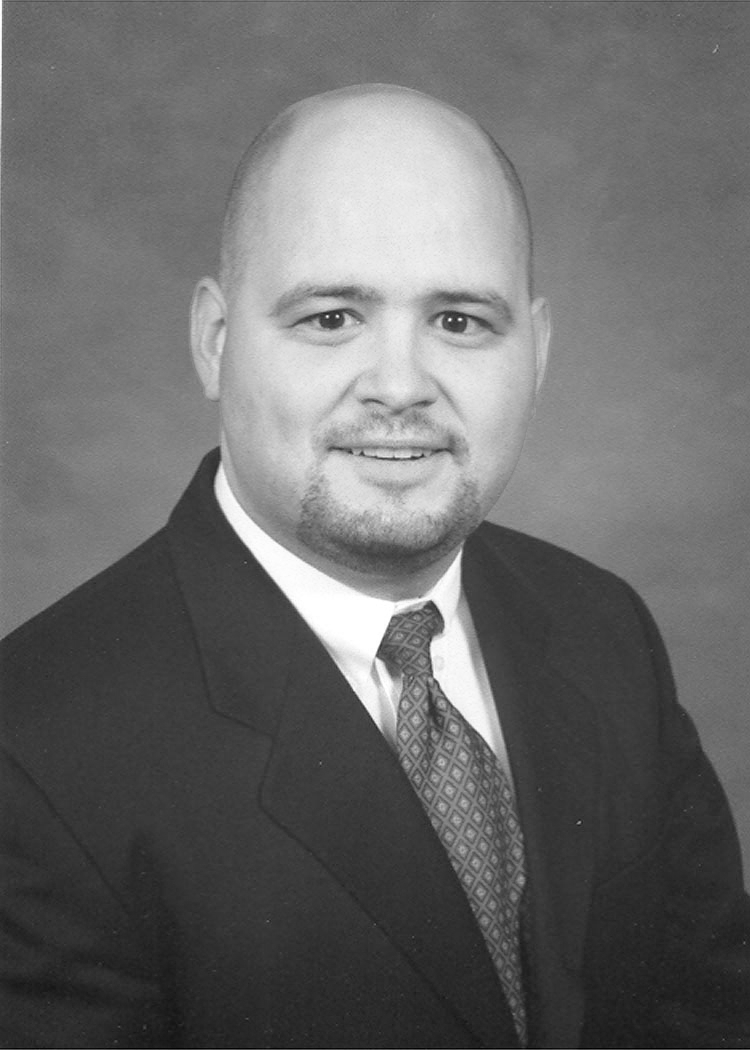
Rob Bodine
Posted by Rob Bodine at 11:59 PM | Comments (0)
The Internet's Spine Problem: "Big Mouths. No Names".
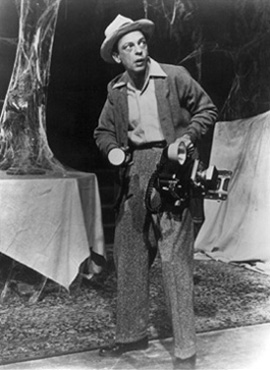
Mr. Chicken: He comments, and blogs, but doesn't use his real name. Some day he'll become a person, who'll put his real name behind his public thoughts. In the meantime, ignore him.
The marketplace of ideas is not well served by "no-name" writers and thinkers. And if you think about it, anonymous commenters have chosen to be in a lower caste. In a society where by law, or cultural folkways, we are not permitted to discriminate, here's your chance to break the rules for solid reasons. And do some good, too.
Exclude them. Insist on real names--or just block the comment. Exceptions to the requirement of identifying one's self in the blogosphere should be extremely rare.
The Problem: Nameless Bloggers and Commenters. "Hi, I'm Nothing. And No One. Here's what I really think? Very valuable. My opinions are very strong. Want to hear them?" No, sir, I really don't. Who with any character or intelligence would? So why do so many frequent and regular commenters--to this blog and others, in both North America and Europe, legal and non-legal--lack the courage and self-respect to use their real names?
And why do so many bloggers themselves put up with it? For example, see the very fine and enduring Above the Law. There, and at this blog (far less traffic, far fewer comments), the best comments seem to be by actual people who give their actual names. But there are too few of them.
Comments from identified humans are easier to swallow because they have more credibility. A reputation--of a real person, who has taken a risk--backs the comment.
1. At many blogs, the comments are routinely anonymous. Oddly, to me, they appear to be, and often claim to be, from males. "Men". Some no-name comments are wonderful. Some are funny; a few ABL comments are classics, and can be wickedly witty and biting. Some are dumb. Or absurd (that's okay). Some are cries for help. Some are based on horribly unfair innuendo and/or defamatory. Some are vicious.
2. I can be pretty mean and opinionated, too. Even vicious. Sometimes I get paid for that. But I'll sign my name to my ideas--and thereby to all my shortcomings.
3. People who have no spine: an industrial accident, maybe? A war injury? Tell me about that. WAC? is all ears, and we have a big heart.
4. So you don't give your real name. You're dressing it up--the condition of having no-sand--as a "privacy" protection? That it?
5. Are no-name commenters just Slaves and Peasants--leading lives of quiet desperation? Are they constantly in fear about losing their jobs? My humble opinion: they hate themselves, or have very little confidence in what they are thinking and saying. But under no circumstances are they worthy of your time--or even your thoughts.
6. I am fascinated by this. How did this all start? Our New Age digital spine deficiency. How can we end it? You know, become real people again. People with courage and character. All those old verities. How brave do you have to be in the blogosphere? Just a bit? Brave enough to use your own name?
7. Can we fine tune the Internet, and blogosphere? The Internet is still very new--and still very much an American phenom. Yanks built it, and will continue to control it, likely for decades. But play time is over. Can we now lead a little? We can make it more valuable, and more useful.
And more responsible and credible. We can make the Internet's dialogue more attractive to the entire world--respected by everyone as a fine and promising experiment in the trade, flow and use of great ideas.
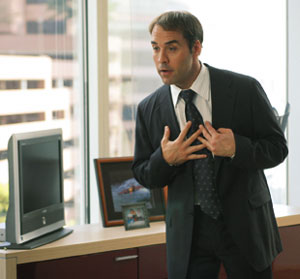
Ari Gold (likely based on one of the Emanuel brothers and played by Jeremey Piven): You might not like him--he's funny but abusive, dismissive and rude, right? But WAC? bets that the real Ari has the sand to use his own name on the Net. (HBO)
One Possible Solution? Well, WAC? is seriously considering a policy of "No Real Name, No Real Publish, Jack". A no-wankers policy. Set up safe and respected no-wank zones. No-wimp zones. "Spine-required" districts. How about just "no-wuss zones"? A little extreme? No, not really. The nameless-pundit problem is a serious and extreme impediment to the reliability, quality and future reputation of the Internet. In short, those folks are making us all look silly. They dumb down, and degrade, a fine project. And we're buying into it by letting them play along with us.
We can't, of course, legislate courage and accountability in the blogosphere, in legal or other communities. But self-respecting and serious bloggers everywhere--all around our New World in many different countries--can insist on maintaining their own sites as no-wuss zones. The marketplace of ideas is very rarely--if ever---well served by "no-name" writers and thinkers. They have nothing to lose by "lobbing in there" anything they feel like--and they are wasting your time, folks.
NWZs might (a) improve dialogues globally (some non-Anglo cultures don't "get" anonymity, or drive-by viciousness or pointless rudeness by fire-breathing no-names) (b) force better content in comments by making people think before they pushed "publish" or "send". They would make the blogosphere (c) more responsible, and a lot smarter all way around. In some cases, NWZs might even help some commenters (d) grow as humans, or grow up.
NWZs would also help (e) reduce the amount of "Ephemera". Insubstantial one-liners in the hands of people who aren't that witty or biting to begin with, or who just don't use words well, is often pathetic. Ephemera. It's something that practicing lawyers, and their business clients, not only strive to avoid, but justifiably look down on, and often even detest as a waste of precious time of life and work.
A Policy of Attraction. "NWZ" policies at enough blogs might have other good and productive effects. Lots of NWZs could (f) attract writers and thinkers not currently very active in the blogosphere to dive in and participate in it. Many talented and forthright people I talk to who are intrigued--and often very surprised--by the fact our firm has a blog, and I would ever write for such a "techie" device. They still believe the blogosphere is for: younger people, insular techies, digital circus barkers, dilettante journalists, pseudo-philosophers and, frankly, "lightweights" of the first order. Sorry but that is a fact; lots of people don't think blogging and other forms of social networking is noble or "cool". They are often (not always) laughing at you. I'd love it if the blogosphere were more attractive to them--they might participate
And a Tool of Retention. Lastly, but importantly, enough NWZs also (g) might encourage talented and well-meaning commenters and bloggers who "have had enough", and who are disillusioned, to stay in the blogosphere.

WAC?'s no-wuss zone will start--if it starts at all--very soon. The proposed rule we promulgate today: "No name. No comment. Screw you." Possible exception: (1) you have an established Internet "personality"; (2) we have met you in person; and (3) we know your real name, and mailing and office address (and know where to serve the summons or subpoena).* I realize that this test would close the doors to many commenters--some with interesting things to say--who regularly weigh in with WAC? But I see no reason to make exceptions.
Comments to this blog are generally fine--and often uplifting and educational. Not all of them. But we have still published 100% of them since August 1, 2005 when we started, even when my staff didn't want some of them published. We know that a few (maybe three) were from people who were fired from, or quit, my law firm, and who were very offended by simple work. But most were from the NYC and LA area--two of my favorite places. They have been from angry "hiders". Okay, they are cowards. A lot of the people who read this blog are, apparently, cowards. Wow. We said it. Also extreme. And also true.
One other new practice I'd like to see, and will adopt immediately myself--and for the other writers of this blog. It's a NW "personal" policy re: commenting on other people blogs which all of us could adopt. If someone enters into a thread on a name-less basis, do not respond to them. Ignore them. Unless circumstances for anonymity are both compelling (there will be a few isolated instances writers direly need a "protection") and readily understandable, you should feel free to treat the speaker--him, her, them or it--as simply "not there", and never worth engaging.
Comment Period to our WAC? proposed NWZ Rule: June 6 through June 12, 2009. But don't even think about it unless you sign your real name. Identify yourself. We'd all love to know who you really are.
Important Note: If your reason for your "no-name" comments is that you "don't want your employer to know", that won't cut it in WAC?'s world. A suggestion: either work harder and get promoted, or get a better job, one where you can be a person. Thanks to the incomparable Redford, for his inadvertent inspiration: "Big Mouths. No Names." And to the really tiny fearful people--mainly males, I'd wager--born without spines. This one's for you.
*Only two proper exceptions come to mind thus far: The talented and vile but funny GeekLawyer and the erudite Charon QC. WAC? can expose, embarrass and bring either to his/her/its patrician Southern England knees in a heartbeat, at any time. We know where they live. And, quite seriously, they are both first-rate people who care deeply about ideas, lawyering, the quality of the conversation in the blogosphere, and other humans. I've had Diet cokes with both of them, and may see them both again surprisingly soon--if it doesn't rain too heavily and Charon actually shows up at my new fave secret Mayfair hotel this time, and GL, of course, has finished his thrice-yearly 90-day rehab, or his monthly Lincoln Inn remedial morals-and-manners course, when I am next in London.
(Photo first above: from "The Ghost and Mr. Chicken", Universal Pictures, 1966)
Posted by JD Hull at 12:50 AM | Comments (6)
June 07, 2009
More Nahem
From I Prefer Paris.


Posted by JD Hull at 01:58 PM | Comments (0)
June 05, 2009
John Arthur Carradine (1936-2009)
One of us, if you grew up in the 1960s-1970s. Forget about Shane and Kung Fu, which likely embarrassed him. A brilliant guy from a celebrated acting family of three generations: the New Age Barrymores. Way meaner, edgier, smarter and tougher than Cole Younger, who he played in the James-Younger Northfield raid saga. Eldest son, Alpha male, part-Beat, part-Hip. Seeker. He didn't care what you thought.
David Carradine was on a short list of people who got right to the point--and told you the brutal truth. Authentic. A non-wimp's evil answer to Phil Donahue. Could not be bothered with trendy people, weenies, hedgers or metro-sexuals--or anyone else who forgot who they really are. AP: "Actor David Carradine found dead in Bangkok."

Posted by JD Hull at 04:32 PM | Comments (4)
Standards. Tools That Work. Get Some.
Is the usual "sales" model designed for failure? Renaissance human, NYT-best selling author and sales consultant Sharon Drew Morgen asks: "Why Is A 90% Failure Rate Ok?" Excerpts:
[We] lose clients we shouldn’t lose. What a waste - not only for sellers, but for buyers. 90% of the prospects don’t come back. Not because our product isn’t good, or because our solution doesn’t match their need.
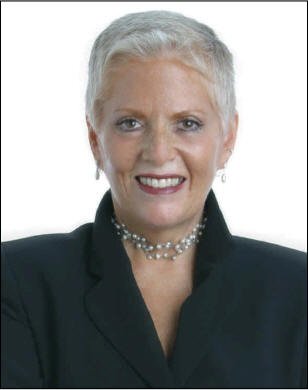
Posted by JD Hull at 12:44 AM | Comments (0)
June 04, 2009
Santa Barbara

Posted by JD Hull at 11:59 PM | Comments (0)
China Law for Business: Marriage, Mistresses--and Love's Odd Equitable Remedies.
Make beaucoup dollar. Now give back. Here's something that didn't happen in Elkhart, Muncie or Connersville last week. Or Indianaoplis, either. At Dan Harris's thoroughly cosmopolitan yet endearingly Indiana-loving China Law Blog, see "China Sex, Mistresses, And Improper Payments, And What They Mean For Your China Business Litigation."
Does ex-Hoosier and Seattle-based Harris have China business covered, or what?

"Hui Ying pay all money back."
Posted by JD Hull at 11:59 PM | Comments (0)
Make Yours Moxie.
Demand first-rate work of yourself, and others. (1) What are you doing today? (2) What are your employees doing for you today?

Posted by JD Hull at 11:57 PM | Comments (0)
The Economist: Please Don't Kill Yankee Drive.
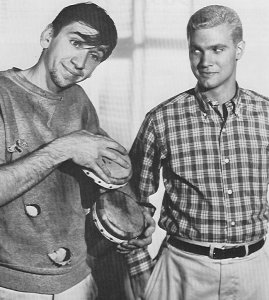
Even Brits like us "the way we were". In an opinion piece that will trouble the Slackoeisie, and more senior looters in the new sloth movement, the 166-year-old The Economist graces us with "Piling On: In His Zeal To Fix Capitalism, Barack Obama Must Not Stifle America’s Dynamism". Excerpts:
The American economy is dynamic because Americans like it that way, even now. A Pew poll released on May 21st found that 76% of Americans agree that the country’s strength is “mostly based on the success of American business” and 90% admire people who “get rich by working hard”.
America’s free-market capitalism has always been a model for the rest of the world. By all means fix its flaws, Mr Obama; but do not take its dynamism for granted.
Thank you, sirs.
To unfashionable working lawyers in the West: Whether or not a post-war European statism sloth trend "takes" in the U.S., let's never send messages to doers, innovators, inventors, passionate employees, and other "huntin' dogs"--in our clients' or our own workplaces--that they and their energies are no longer PC, no longer valued, or otherwise not welcome. Keep the class. Dump the trash.
Posted by JD Hull at 12:40 AM | Comments (0)
June 01, 2009
Part II--"Wartime Consigliere": Bunnies with JDs are nice but...
A Warrior knows how to make peace. A Scared Bunny will never know how to win a war.
--Scott Greenfield. Trial Lawyer. Philosopher. Planner. Aggressive Human. [upper case in mid-sentence by WAC? for emphasis]
"Worse still, a scared bunny will do everything in his power to avoid a war." Bunny GCs and Bunny outside lawyers, if you think about it, may be in the majority.
That's okay. Not every lawyer needs to be a take-charge, overbearing, fire-breathing litigator. Or a "mean person" who is demanding and aggressive, God forbid. But you do need a couple of nasty folks like that in your camp.
Lawyers. Most of us like puppy dog tails, canned jokes that only CPAs and bank employees would laugh at, "Lassie" movies, Sweetness, Light and Get-a-Life conferences during a Recession.
(Note: I can't get over the ugly and embarrassing reality of such a gathering. If anyone said I had attended--even in jest--I would hire a certain lawyer at a Cleveland-based DC shop and sue for defamation, and under the Lanham Act, in a heartbeat. How about a "Get-a-Pair" conference?)
And we are a reasonably intelligent, gentle folk. We don't raise our voices. Are risk-averse. Don't like to run things. Don't market. Don't yell, swear or bully. Tom Hagen was a "nice" guy. (And worthless except for that fun LA horse head thing; you can have him.)
And we are "nice guys" not because we are "moral" or "professional" or "deliberate" or "smart"--that's all a crock. It's because we just don't like violence. It's so, well, icky. Not in our nature. Most of us don't fight. Even for clients--and I see this every day. We are lawyer-centric. Club Dweeb. The Bunny Bund. Face it.
But you DO want a few non-Bunnies around you and yours, occupying certain positions of trust and importance in your company, or law firms. Yes. You do. Trust us.
So be extra nice to a few mean people today. See this one at Simple Justice: "A Wartime Consigliere".

A Hagen Bunny at work: "Hey, can't we just keep talking?"
Posted by JD Hull at 11:55 PM | Comments (0)
Yes--and your GC should be a "Wartime Consigliere".

The Wrong Stuff: Thomas "Tom" Feargal Hagen (Paramount Pictures)
It's not a Godfather thing, not a macho thing, not a litigation thing. It's just a business fact, especially in changing industries. And especially now. General Counsel at corporations do make a difference:
1. She should be broad-gauged, intellectual, take-charge, organized, preventive, resourceful--and War-like at heart.
2. Hates war as expensive--but likes and even revels in a fight.
3. Tells management what to do--and not a tentative, qualified "what you can do".
At his well-regarded Law Department Management, Rees Morrison, by far one of the smarter, sager and more experienced lawyer-consultants out there, just asked "Does a General Counsel Make All That Much Difference?" Our two cents is in the WAC? post title above. The right GC? Get thee a philosopher-warrior. Be safe and feel safe, friends.
Morrison goes a bit farther, inspired in part by this month's Atlantic piece "Do CEOs Matter?, by Harris Collingwood. See also our short recent post, "Proctor & Gamble's Lafley: Look to the meaningful outside", on CEO A.G. Lafley's recent thoughts about CEO uniqueness in May's Harvard Business Review.
Morrison excerpt:
Other researchers have found that CEO leadership matters relatively less in constrained industries, such as electrical utility industries, than in hotly competitive, fast-changing industries.
A similar conclusion probably applies to general counsel: legal/business calls are tougher and more frequent in roiling industries so the top lawyer has more opportunity to make a difference.

Expert on The Right Stuff: Rees Morrison
Posted by JD Hull at 12:20 AM | Comments (1)
